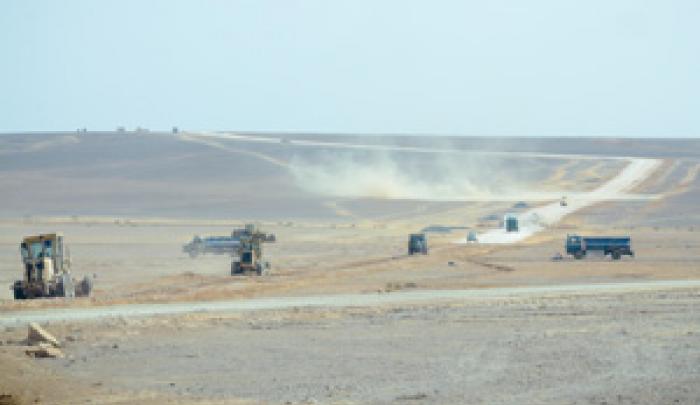Highlights
- By Philippe Guiton, director of the Syria Crisis response for World Vision

Thursday, June 20, 2013 is World Refugee Day and humanitarians will be hard at work in Jordan’s northeastern desert helping to build what will become the country’s largest refugee camp.
The scale of the Syrian refugee crisis is now so vast that our staff is in a race against the clock to lay seven miles of piping and dig in 2,600 septic tanks, each the size of a small car.
These pipes will deliver more than two Olympic-sized swimming pools’-worth of water every week to 31,000 of the 130,000 refugees who will soon live in this camp. This amounts to approximately seven gallons per person, per day for personal hygiene, drinking and washing, all in the searing desert heat. To put that into perspective, the U.S. Geological Survey estimates the average American uses 80 to 100 gallons a day.
Azraq will be a challenging place to raise children, but it will still be better than the insecurity families have left behind. The camp is due to receive its first Syrian refugees this summer
The experience of Syrian refugees is like that of so many refugees across the globe. It is to have lost one’s home, one’s loved ones, one’s job, one’s sense of belonging, and sometimes the hope of ever returning home.
This year, the situation facing Syria’s 1.6 million refugees is terrifying the international aid community because the scale of the problem shows no signs of abating. In fact, things are getting worse. On average, every minute one new refugee enters Jordan, and it’s the same story in Lebanon. The situation is almost as bad in Turkey and increasingly serious in Iraq. The donor funding to meet this scale of need is wholly inadequate.
Without international assistance the aid agencies, local people and the governments of Jordan, Lebanon, Turkey, and Iraq will soon be overwhelmed
The race is on to open Azraq Camp because Za’atari, the other camp in Jordan, is already home to more than 100,000 refugees. These camps are the size of cities
You are confronted with the feeling that without a miracle the region will either collapse under the weight of the problem or implode with the tensions that it brings. Everyone is losing patience. People crave home and a return to peace.
But it is still not too late to bring an end to the suffering. The international community must put all efforts behind a negotiated solution to the crisis through peace talks and a cessation of hostilities. Bringing further arms into the conflict, as some governments are considering, will only cost more civilian lives and prolong the crisis. Over 90,000 Syrians have died already, including children. Many more have been maimed.
No one is saying that getting the opposing parties and governments to talk peace is easy. Failed attempts to bring the protagonists to the table have already proved how hard this is. But two years of conflict have already torn communities of neighbors, faiths and ethnic groups apart. The bitter experience of other conflicts in the region should make all of us demand immediate negotiations towards a peace settlement.
In the meantime, aid funding is urgently needed. Two weeks ago the UN launched its largest ever humanitarian appeal – for $4.4 billion – warning that by the end of the year 10 million Syrians would need aid, if the situation continues to worsen at its current rate.
This aid needs to be given in ways that allow humanitarian agencies to deliver aid where it is needed, across borders if necessary, and to do that impartially — without it being tied to political or military objectives.
The funding to pay for World Vision’s water and sanitation work in Azraq Camp will be exhausted in four months. Fundraising for the next phase has already begun. All aid agencies are facing similar concerns that make it very hard to plan ahead, staff up and deliver what is needed.
As we mark World Refugee Day it is important to remember that those who have fled terror to the safety of a refugee camp are people with families, lives and dreams. As World Vision and other organizations work to meet their immediate needs, we need to act as well to bring peace and reconciliation.
– END –
About World Vision:
World Vision is a Christian humanitarian organization conducting relief, development, and advocacy activities in its work with children, families, and their communities in nearly 100 countries to help them reach their full potential by tackling the causes of poverty and injustice. World Vision serves all people regardless of religion, race, ethnicity, or gender. For more information, please visit www.WorldVision.org/media-center/ or on Twitter @WorldVisionUSA.